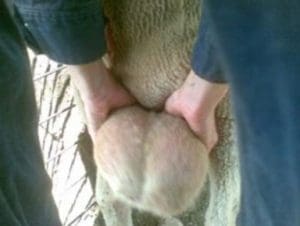
Checking a ram’s reproductive health is important. Image – LLS.
NEW South Wales sheep farmers have been reminded to check their rams before and after joining, to ensure they are fit to do their work and avoid potential spreading of disease.
Local Land Services Veterinarian Scott Ison said producers should be on the lookout for signs of lameness and checking feet, as well as abnormalities with teeth, eyes, and reproductive organs.
“It’s important producers are checking their rams, making sure they’re in good body condition with no signs of illness, so they can successfully join a flock and later breed.
“Coming up to joining, producers should be allowing themselves enough time to see how many replacements are needed, especially if any infections such as Ovine Brucellosis (OB) be found,” Dr Ison said.
“OB is an infection of the reproductive tract that causes infertility in rams and less commonly abortion in ewes, which can result in considerable economic losses for producers.
“It can spread quickly through the ram flock and is usually introduced with new rams or strays,” he said.
“OB can cause lesions in testicles and can cause reduced or prolonged lambing, so if you are noticing any of these symptoms, please speak to a vet.”
Surplus rams must be fit to load
Dr Ison has also reminded landholders that rams should be adequately prepared and fit to load before they are transported to saleyards across the state, especially if they are being culled because they are lame, blind or have lesions.
Producers who sell animals that are not fit to load may be prosecuted by the RSPCA or other enforcement agencies.
“Rams, as well as all livestock, need to be transported in a way that reduces stress and minimises any risks to animal welfare,” Dr Ison said.
“To ensure rams are fit to load some may need veterinary treatment and producers should be checking for common health issues such as swollen or injured testicles, lameness and blindness.
“Injuries can be detected at saleyards or abattoirs by the on-plant vet and reported to the RSPCA for investigation – our advice is if in doubt, leave it out.”
To download the latest national ‘fit to load’ guide by Meat & Livestock Australia (MLA), visit mla.com.au/isitfittoload.
For more information and advice on pre-breeding assessments and animal load requirements, contact your local veterinarian or closest Local Land Services office on 1300 795 299.
Source: LLS.

Do they really need to be actually reminded about the requirements for transport?…it’s law in the new Act and agents should be right onto it.